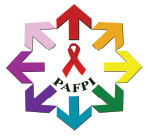“There is a certain affected population who does not want to be screened in testing facilities, and it is where the community-based screening (CBS) comes in as a testing alternative,” shares Richard Bragado, Monitoring and Evaluation Officer, EPIC Project.
By bringing HIV testing closer to the clients, CBS can strengthen PAFPI’s service delivery. Fifteen PAFPI staff trained on HIV screening that could be done in places outside the facility (such as restaurants, parks, or areas where the clients are). “CBS is normalizing HIV testing, minimizing stigma, and increasing access to testing,” Bragado explains.
How does CBS work?
Rapid HIV testing is done in a non-laboratory setting and performed by a trained healthcare provider or a member of a community-based organization like PAFPI. “Just like other testing options, CBS still follows the protocol on securing testing consent through written or recorded verbal consent.”
More so, it observes the protocols defined in the Philippine HIV and AIDS Policy Act (RA 11166), Responsible Parenthood and Reproductive Health Act of 2012 (RA 10354), and Special Protection of Children Against Abuse, Exploitation and Discrimination Act (RA 7610), and other related issuances. Aside from securing the client’s consent, the testing is done with strict observance of privacy and confidentiality.
Is Index Testing Voluntary?
Index testing done in CBS takes on the proactive approach wherein HIV testing is offered to the clients. However, it is to highlight that the testing is voluntary or kusa and follows the consent, privacy, and confidentiality protocols.
Aside from CBS, PAFPI has been using alternative means to reach clients. “Social media, particularly Facebook, is a venue for the HIV care and support organization to increase client engagement by addressing issues and concerns on HIV service delivery, including testing,” shares Bragado.
